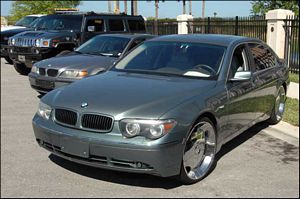|
By accessing or using The Crittenden Automotive Library™/CarsAndRacingStuff.com, you signify your agreement with the Terms of Use on our Legal Information page. Our Privacy Policy is also available there. |

Steering Clear of Car Cloning
|
|---|
|
|
Steering Clear of Car Cloning
Federal Bureau of Investigation
March 24, 2009
 In Tampa, some of the luxury vehicles seized in “Operation Duel Identity,” a multiagency investigation into car cloning and auto theft that spanned 20 states and three countries In Tampa, some of the luxury vehicles seized in “Operation Duel Identity,” a multiagency investigation into car cloning and auto theft that spanned 20 states and three countries
|
Some Advice and Solutions
Car cloning: stealing the identity of a legitimately-owned vehicle and slapping it onto a stolen car.
It’s a serious crime problem that’s being aggressively investigated by law enforcement. For example: today in Tampa, we joined with our partners in announcing that 17 major players in a long-running car cloning criminal enterprise have been indicted by a federal grand jury.
The good news is that in the not-too-distance future, a new national database may help make car cloning a thing of the past.
How does car cloning work? Like the Tampa case, it begins with a stolen vehicle—usually a luxury car or fully-loaded SUV.
Then, the vehicle is “cloned”—its manufacturer-installed Vehicle Identification Number (VIN) plate is pried off and replaced with another one. This second VIN plate actually holds a legitimate number that came from a vehicle of a similar make and model in a different state. Other phony ownership documents complete the cloning. At that point it can be easily registered with a motor vehicle agency in another state.
Once the stolen vehicle is registered anew, it can be sold. In the Tampa case, more than 1,000 cloned cars were sold to witting and unwitting buyers in 20 states and several countries, with estimated losses of more than $25 million to consumers, auto insurers, and other victims.
So how big is the possible impact of cloning on consumers? Huge. If you buy a cloned vehicle and its true pedigree is discovered, the car will be confiscated, and you’ll still be responsible for any outstanding loans. If your vehicle is the victim of car cloning, you could be accused of a variety of offenses—from parking tickets or cutting somebody off in traffic...to serious criminal activity like organized crime. And you could spend a great deal of time and money trying to prove that it wasn’t you or your car after all.
Enter NMVTIS, or the National Motor Vehicle Title Information System. This Department of Justice database, operated by the American Association of Motor Vehicle Administrators, is an electronic system that links state motor vehicle departments together…and once fully operational should go a long way towards shutting down car cloning activities. If a car is titled in one state, a criminal should not be able to steal its VIN and use it on another vehicle in another state—the database will spit out a hit showing that the number is already in use.
So far, 37 states participate or are in the process of participating in the system. A federal law mandated the creation of the database and the participation of all 50 states by next year.
Tips on how to steer clear of car cloning:
If you think your car was cloned (for instance, you receive notice of unpaid parking tickets that aren’t yours), contact your local police.
If you’re car shopping, beware of a car being sold for substantially less than comparable makes and models.
Get a copy of the car’s vehicle history report.
Check out the VIN plate on the dashboard for any evidence of tampering (scratches, etc.).
Look for incorrect spellings on paperwork, like vehicle titles.
Trust your intuition—if it sounds too good to be true, it probably is!


















 In Tampa, some of the luxury vehicles seized in “Operation Duel Identity,” a multiagency investigation into car cloning and auto theft that spanned 20 states and three countries
In Tampa, some of the luxury vehicles seized in “Operation Duel Identity,” a multiagency investigation into car cloning and auto theft that spanned 20 states and three countries
